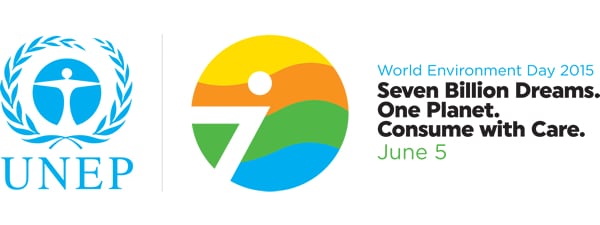 June 5 is World Environment Day 2015, and this year’s theme is “Seven Billion Dreams. One Planet. Consume with Care.” We typically think in general terms about recycling, water usage, and climate change, and in turn wonder how one person can possibly make a difference. Below you will find some environmental facts over which the individual has some control. Simply being aware of our environmental footprint will help us all become more mindful of our own daily habits, which will cumulatively make a significant impact on the health of our world, now and in the future.
June 5 is World Environment Day 2015, and this year’s theme is “Seven Billion Dreams. One Planet. Consume with Care.” We typically think in general terms about recycling, water usage, and climate change, and in turn wonder how one person can possibly make a difference. Below you will find some environmental facts over which the individual has some control. Simply being aware of our environmental footprint will help us all become more mindful of our own daily habits, which will cumulatively make a significant impact on the health of our world, now and in the future.
 TRASH. Each person throws away approximately four pounds of garbage every day, and 14 billion pounds of trash is dumped into the ocean every year. 84% of all household waste can be recycled.
TRASH. Each person throws away approximately four pounds of garbage every day, and 14 billion pounds of trash is dumped into the ocean every year. 84% of all household waste can be recycled.- PLASTIC. Most families throw away about 88 pounds of plastic every year, and plastic takes about 500 years to biodegrade. Only 1 in 7 plastic bottles is recycled.
- WATER. If all U.S. households installed water-saving features, water use would decrease by 30%, saving an estimated 5.4 billion gallons per day. This would result in dollar-volume savings of $11.3 million per day or more than $4 billion per year.
- PAPER. Every ton of paper recycled saves 7,000 gallons of water and 17 trees. Recycled paper requires 64% less energy than making paper from virgin wood pulp.
- ALUMINUM. 5 billion aluminum cans are used each year. It takes 90% less energy to recycle aluminum cans than to make new ones.
- OIL. There are an average of 27 oil spills every day somewhere in the waters of the worlds. One gallon of motor oil can contaminate up to 2 million gallons of water, and approximately 5 million tons of oil produced in the world each year ends up in the ocean.
- LAWNS. Residential lawns and gardens are doused with 80 million pounds of chemical pesticides and 70 million tons of fertilizers annually. In addition, water sprinklers can consume 265 gallons of water in one hour, which exceeds estimates of the average U.S. household’s daily use.
As Americans, it is easy to find ways to conserve. Think about this: the U.S. holds 5% of the world’s population but uses 25% of its natural resources. America has less than 4% of its forests left and uses 500,000 gallons of oil every minute. Taking into account all uses of water, including drinking, sanitation, and food production, each human being requires about 12 gallons of water per day to live, yet the average American uses about 100 gallons per day. One person does make a difference. Becoming more mindful will help the environment now and for future generations, so let’s vow to do our own individual part to save our planet. Happy World Environment Day!
